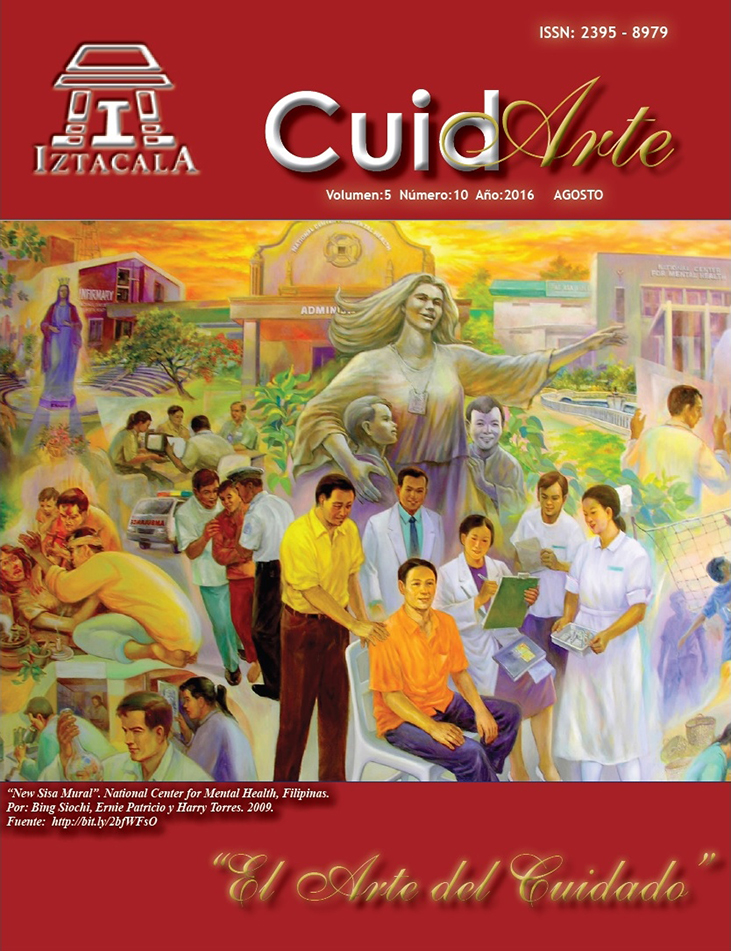Self-care level in university students of five degrees in the area of health
Main Article Content
Abstract
Self-care could be seen as the ability of an individual to
perform the necessary activities to improve its quality
of life. In this research the level of self-care in college
students from FES Iztacala is evaluated and also how
this influences their role in professionalism and health
care. The research is observational, transversal,
prospective and analytical, with a quantitative
approach; it was held within the FES Iztacala locations
from August 5th through November 6th of (2015).
Involving 200 college students from the Bachelor of
Biology, Nursing, Medicine, Dentistry and Optometry,
all enrolled in their 5th semester of their careers,
the sample is divided evenly by 100 women and 100
men, taking into account both shifts.
Methodology:
The evaluation instrument was developed based
on the theory of Dorothea Orem Self-care to assess
student self-care. To assess the health status Health
Questionnaire ST-35 is done, this instrument has been
modified for easy application. Which has an alpha of
0.76. It is based on the scale liker a total of 24 items.
Results:
the results show that the highest rates of good
self-care belong to Nursing and Biology. However the
observed differences between the races in medicine,
dentistry and optometry are not so obvious with
each other, the relationship between students and
what they learn in their careers for a good self-care
is not all bad but can be improved, what which could
indicate that knowledge in the field of health are not
applied in the ideal proportions for various reasons.
Downloads
Article Details
References
(1) Martínez Hernández Daniela, Sáez Muñoz Pamela. Conductas de Autocuidado en estudiantes universitarios residentes del complejo de hogares Huachocopihue de la UACh, 2006. Tesis de grado. Universidad Austral de Chile. 2007. http://cybertesis.uach.cl/tesis/uach/2007/fmm188c/doc/fmm188c.pdf. Fecha de consulta: 04 de octubre de 2015.
(2) Rodríguez Cabrera, Aida, et al. Estrategia Educativa Sobre Promoción En Salud Sexual Y Reproductiva Para Adolescentes Y Jóvenes Universitarios. Revista Cubana de Salud Pública 2013; Vol. 39 (1) http://scielo.sld.cu/scielo.php?pid=S0864-34662013000100015&script=sci_arttext Fecha de consulta 04 de octubre de 2015.
(3) Tesis Uson. Capitulo II, Marco Referencial. http://tesis.uson.mx/digital/tesis/docs/22398/Capitulo2.pdf (Fecha de consulta 04 de octubre de 2015.
(4) Orem D. Modelo de Orem. Conceptos de enfermería en la práctica. Barcelona: Ediciones Científicas y Técnicas S. A. Masson Salvat Enfermería; 1993.
(5) Francisco del Rey C, Benavent Garces MA, Ferrer Ferrandis E. El Modelo De Dorothea E. Orem. Colección Enfermería S21. 2ª ed. Madrid: Difusión Avances de Enfermería (DAE); 2009. p. 340-381.
(6) Franco Peláez Zoila Rosa, Duque Escobar Jorge. La Bioética Y El Autocuidado De La Salud: Imperativos Para La Formación Integral En La Universidad. 2015. Vol. 21 (1)http://www.scielo.cl/scielo.php?pid=S1726-569X2015000100005&script=sci_arttext. Fecha consulta 04 de octubre de 2015.
(7) Orozco L. La formación integral: mito o realidad. Educación y Ética. http://www.ubiobio.cl/miweb/webfile/media/212/documentos/FORMACION%20INTEGRAL%20MITO%20REALIDAD.pdf Fecha de consulta 04 de octubre de 2015.
(8) Intra María Victoria, Gil Roales-Nieto Jesús y Moreno San Pedro Emilio. Cambio En Las Conductas De Riesgo Y Salud En Estudiantes Universitarios Argentinos A Lo Largo Del Periodo Educativo. 2011. International Journal of Psychology and Psychological Therapy. Vol. 21 (1) http://www.ijpsy.com/volumen11/num1/289/cambio-en-las-conductas-de-riesgo-y-salud-ES.pdf . Fecha de consulta 04 de octubre de 2015.
(9) Rebolledo Oyarzo Paulina Daniela. Autocuidado En Los Estudiantes De la Carrera De Enfermería De La Universidad Del Bío Bio: Un Análisis Según El Modelo De Autocuidado De Dorothea Orem. Tesis de grado. Universidad Austral de Chile. 2010. http://cybertesis.uach.cl/tesis/uach/2010/fmr292a/doc/fmr292a.pdf Fecha de consulta 04 de octubre de 2015.
(10) Rodríguez R. L., Jordán J. Ma. et. al. Formación profesional y desarrollo de capacidades de autocuidado en estudiantes de Licenciatura en Enfermería. Waxapa 2014;(10):7-18. http://www.uan.edu.mx/d/a/publicaciones/revista_waxapa/pdf/waxapa_10.pdf Fecha de consulta 04 de Octubre de 2015.

